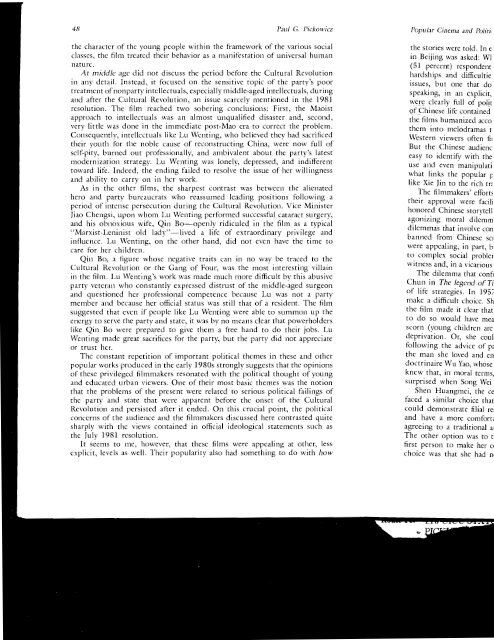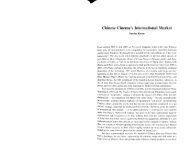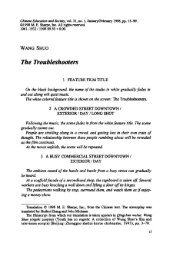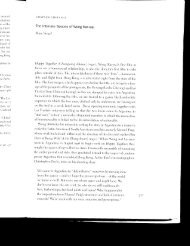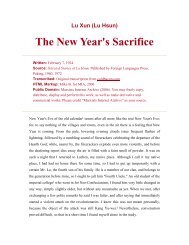Popular Cinema and Political Thought in Post-Mao China
Popular Cinema and Political Thought in Post-Mao China
Popular Cinema and Political Thought in Post-Mao China
You also want an ePaper? Increase the reach of your titles
YUMPU automatically turns print PDFs into web optimized ePapers that Google loves.
48 Paul G. Pickowiczthe character of the young people with<strong>in</strong> the framework of the various socialclasses, the film treated their behavior as a manifestation of universal humannature.At middle age did not discuss the period before the Cultural Revolution<strong>in</strong> any detail. Instead, it focused on the sensitive topic of the party's poortreatment of nonparty <strong>in</strong>tellectuals, especially middle-aged <strong>in</strong>tellectuals, dur<strong>in</strong>g<strong>and</strong> after the Cultural Revolution, an issue scarcely mentioned <strong>in</strong> the 1981resolution. The film reached two sober<strong>in</strong>g conclusions: First, the <strong>Mao</strong>istapproach to <strong>in</strong>tellectuals was an almost unqualified disaster <strong>and</strong>, second,very little was done <strong>in</strong> the immediate post-<strong>Mao</strong> era to correct the problem.Consequently, <strong>in</strong>tellectuals like Lu Went<strong>in</strong>g, who believed they had sacrificedtheir youth for the noble cause of reconstruct<strong>in</strong>g Ch<strong>in</strong>a, were now full ofself-pity, burned out professionally, <strong>and</strong> ambivalent about the party's latestmodernization strategy. Lu Went<strong>in</strong>g was lonely, depressed, <strong>and</strong> <strong>in</strong>differenttoward life. Indeed, the end<strong>in</strong>g failed to resolve the issue of her will<strong>in</strong>gness<strong>and</strong> ability to carry on <strong>in</strong> her work.As <strong>in</strong> the other films, the sharpest contrast was between the alienatedhero <strong>and</strong> party bureaucrats who reassumed lead<strong>in</strong>g positions follow<strong>in</strong>g aperiod of <strong>in</strong>tense persecution dur<strong>in</strong>g the Cultural Revolution. Vice M<strong>in</strong>isterJiao Chengsi, upon whom Lu Went<strong>in</strong>g performed successful cataract surgery,<strong>and</strong> his obnoxious wife, Q<strong>in</strong> Eo-openly ridiculed <strong>in</strong> the film as a typical"Marxist-Len<strong>in</strong>ist old lady"-lived a life of extraord<strong>in</strong>ary privilege <strong>and</strong><strong>in</strong>fluence. Lu Went<strong>in</strong>g, on the other h<strong>and</strong>, did not even have the time tocare for her children.Q<strong>in</strong> Bo, a figure whose negative traits can <strong>in</strong> no way be traced to theCultural Revolution or the Gang of Four, was the most <strong>in</strong>terest<strong>in</strong>g villa<strong>in</strong><strong>in</strong> the film. Lu Went<strong>in</strong>g's work was made much more difficult by this abusiveparty veteran who constantly expressed distrust of the middle-aged surgeon<strong>and</strong> questioned her professional competence because Lu was not a partymember <strong>and</strong> because her official status was still that of a resident. The filmsuggested that even if people like Lu Went<strong>in</strong>g were able to summon up theenergy to serve the party <strong>and</strong> state, it was by no means clear that powerholderslike Q<strong>in</strong> Bo were prepared to give them a free h<strong>and</strong> to do their jobs. LuWent<strong>in</strong>g made great sacrifices for the party, but the party did not appreciateor trust her.The constant repetition of important political themes <strong>in</strong> these <strong>and</strong> otherpopular works produced <strong>in</strong> the early 1980s strongly suggests that the op<strong>in</strong>ionsof these privileged filmmakers resonated with the political thought of young<strong>and</strong> educated urban viewers. One of their most basic themes was the notionthat the problems of the present were related to serious political fail<strong>in</strong>gs ofthe party <strong>and</strong> state that were apparent before the onset of the CulturalRevolution <strong>and</strong> persisted after it ended. On this crucial po<strong>in</strong>t, the politicalconcerns of the audience <strong>and</strong> the filmmakers discussed here contrasted quitesharply with the views conta<strong>in</strong>ed <strong>in</strong> official ideological statements such asthe July 1981 resolution.It seems to me, however, that these films were appeal<strong>in</strong>g at other, lessexplicit, levels as well. Their popularity also had someth<strong>in</strong>g to do with how<strong>Popular</strong> <strong>C<strong>in</strong>ema</strong> <strong>and</strong> Politi,the stories were told. In e<strong>in</strong> Beij<strong>in</strong>g was asked: WI(51 percent) respondenthardships <strong>and</strong> difficultieissues, but one that dospeak<strong>in</strong>g, <strong>in</strong> an explicit,wesc:: clearly full of politQf Ch<strong>in</strong>ese life conta<strong>in</strong>edthe films humanized accothem <strong>in</strong>to melodramas tWestern viewers often fi1But the Ch<strong>in</strong>ese audienceasy to identify with theuse <strong>and</strong> even manipulatiwhat l<strong>in</strong>ks the popular !=like Xie J<strong>in</strong> to the rich tr;The filmmakers' effort~their approval were facilihonored Ch<strong>in</strong>ese storytellagoniz<strong>in</strong>g moral dilemmdilemmas that <strong>in</strong>volve conbanned from Ch<strong>in</strong>ese sc1were appeal<strong>in</strong>g, <strong>in</strong> part, bto complex social problerwitness <strong>and</strong>, <strong>in</strong> a vicariousThe dilemma that conf1Chun <strong>in</strong> The legend of Tiof life strategies. In 195/make a difficult choice. Shthe film made it clear thatto do so would have meascorn (young children aredeprivation. Or, she coulfollow<strong>in</strong>g the advice of pathe man she loved <strong>and</strong> endoctr<strong>in</strong>aire Wu Yao, whoseknew that, <strong>in</strong> moral terms,surprised when Song WeiShen Huangmei, the cefaced a similar choice thatcould demonstrate filial w<strong>and</strong> have a more comfortaagree<strong>in</strong>g to a traditional arThe other option was to t


